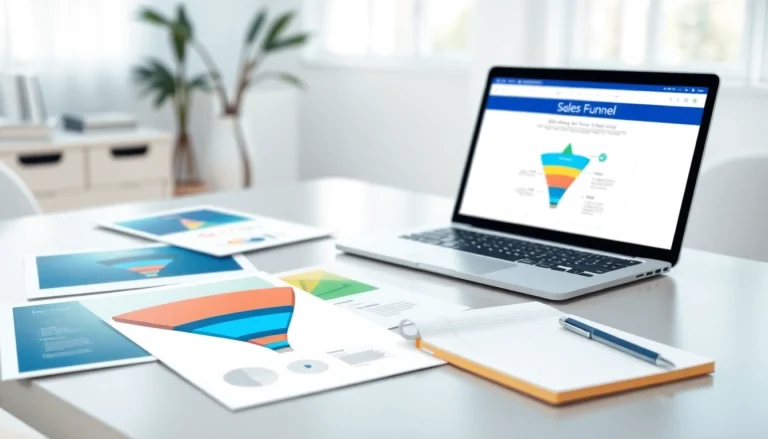
Understanding the Importance of Funnel Templates
In the world of digital marketing, the effectiveness of how you guide potential customers through your sales process can significantly influence your success. This is where Funnel templates come into play. They provide a structured way to map out customer journeys, ensuring every potential lead is nurtured appropriately until conversion.
What Are Funnel Templates?
Funnel templates are pre-designed structures that outline the various stages of a customer’s journey toward making a purchase. They typically include stages like awareness, interest, decision, and action. Each template serves as a framework that marketers can customize with their unique content, branding, and specific products or services. The goal is to streamline the sales process, guiding leads through the funnel efficiently.
Why Use Funnel Templates for Your Business?
Implementing funnel templates can yield significant benefits for businesses, including:
- Time Efficiency: Pre-built structures save time during the design process, allowing marketers to focus on optimizing content rather than building templates from scratch.
- Consistency: Using templates ensures that all marketing efforts maintain a consistent look and feel, which is essential for brand recognition.
- Improved Conversion Rates: Templates are designed based on best practices and data analysis of successful funnels, increasing the likelihood of conversions.
- Flexibility: They can be easily customized to fit specific business needs and target audiences.
Common Misconceptions About Funnel Templates
Despite their advantages, several misconceptions exist about funnel templates:
- They Replace Strategy: Some businesses might think that using a funnel template eliminates the need for strategic planning. However, templates should complement a well-thought-out strategy.
- Only for Large Businesses: Funnel templates are beneficial for businesses of any size. Small businesses can leverage them to enhance their marketing efforts without extensive resources.
- One Size Fits All: While templates provide a framework, they should be customized to resonate with your unique audience and brand personality.
Types of Funnel Templates to Consider
Various funnel templates can cater to different business needs. Here are some common types:
Lead Generation Funnel Templates
Lead generation funnels are aimed at capturing contact information from potential customers. These templates typically include:
- Landing Pages: Focus on converting visitors into leads through compelling offers.
- Opt-In Forms: Capture basic user information, such as name and email address.
- Follow-Up Sequences: Automate the nurturing process through email marketing.
Sales Funnel Templates
Sales funnel templates guide leads through the buying process, ultimately leading to a purchase decision. Essential components include:
- Product Pages: Highlight product features, benefits, and pricing.
- Checkout Pages: Streamline the purchase process to reduce cart abandonment.
- Upsell and Cross-Sell Pages: Maximize revenue by suggesting additional products or services.
Customer Retention Funnel Templates
Retaining existing customers is critical for sustained growth. Customer retention funnels may include:
- Feedback Requests: Collect customer input on products or services.
- Loyalty Programs: Reward repeat customers to encourage continued engagement.
- Re-Engagement Campaigns: Win back inactive customers through targeted offers.
Choosing the Right Funnel Templates for Your Needs
Selecting the right funnel templates is crucial to your marketing success. Here’s how to approach this decision:
Assessing Your Business Goals
Your business objectives should guide your choice of funnel templates. Are you looking to generate leads, close sales, or retain customers? By aligning your funnels with clear goals, you can choose templates that drive the desired outcomes effectively.
Identifying Your Target Audience
Understanding your audience is essential for funnel success. Consider their demographics, pain points, and behaviors. Choose templates that allow you to speak directly to these segments, incorporating specific language, imagery, and offers that resonate with them. This personalized approach can significantly enhance engagement and conversion rates.
Evaluating Design and Customization Options
Design plays a critical role in user experience and conversion. When selecting funnel templates, consider the following:
- Visual Appeal: Aesthetically pleasing designs can captivate users’ attention.
- User Experience: Ensure templates are easy to navigate and optimize for both desktop and mobile users.
- Customization: Look for templates that allow you to make changes easily, reflecting your brand identity and messaging.
Best Practices for Implementing Funnel Templates
Once you’ve selected the right funnel templates, implementing them effectively is essential for achieving desired results.
Testing and Optimizing Your Funnels
Testing is a crucial step in the funnel process. Implement A/B testing to compare different elements, such as:
- Call-to-Action Buttons: Test the wording, color, and placement.
- Headlines: Experiment with variations to see which resonates more with your audience.
- Images: Assess the impact of different visuals on user engagement.
By continually optimizing your funnels based on test outcomes, you can enhance performance over time.
Integrating Funnel Templates with Marketing Tools
Integration is key to maximizing the efficiency of your funnel templates. Consider the following:
- Email Marketing Platforms: Connect your funnels to automate follow-up sequences and lead nurturing.
- CRM Systems: Integrate funnels with customer relationship management tools to streamline lead tracking and follow-up.
- Analytics Tools: Use tracking software to monitor funnel performance and identify areas for improvement.
Monitoring Performance Metrics for Success
Establish clear metrics to evaluate the performance of your funnels. Key performance indicators (KPIs) might include:
- Conversion Rates: Measure the percentage of leads that move through each stage of your funnel.
- Cost Per Acquisition: Analyze how much it costs to acquire a new customer through your funnel.
- Engagement Metrics: Track how users interact with your funnels, including click-through rates and time spent on pages.
Case Studies: Successful Use of Funnel Templates
Learning through real-world examples can provide valuable insights into the effective use of funnel templates.
Examples from Diverse Industries
Businesses across various sectors have successfully implemented funnel templates to achieve their marketing objectives. For example:
- E-Commerce: An online retail company used a targeted lead generation funnel template to capture email addresses in exchange for a discount on first purchases, resulting in a significant increase in sales.
- Education: An online course provider used a sales funnel template that highlighted course benefits and included testimonials, leading to higher enrollment rates.
- Professional Services: A consulting firm implemented a customer retention funnel that nurtured existing clients through regular feedback requests and valuable content, resulting in increased repeat business.
Lessons Learned from Implementing Funnel Templates
These case studies illustrate key lessons to take away:
- The Power of Personalization: Customization is vital for resonating with your audience’s unique needs.
- Data-Driven Decisions: Regularly analyze metrics to adapt and improve funnel strategies based on performance.
- Continuous Testing: Never stop experimenting with different elements to find the most effective combinations.
Future Trends in Funnel Template Design
As digital marketing continues to evolve, so do the trends surrounding funnel templates. Here are a few future trends to consider:
- Artificial Intelligence: AI-driven analytics tools will enhance personalization and predictive insights, tailoring funnels to individual user behaviors.
- Interactive Elements: Incorporating quizzes, polls, and interactive content can increase engagement and provide more personalized experiences.
- Omni-Channel Strategies: Businesses will focus on integrating funnels across multiple marketing channels for a seamless customer experience.






